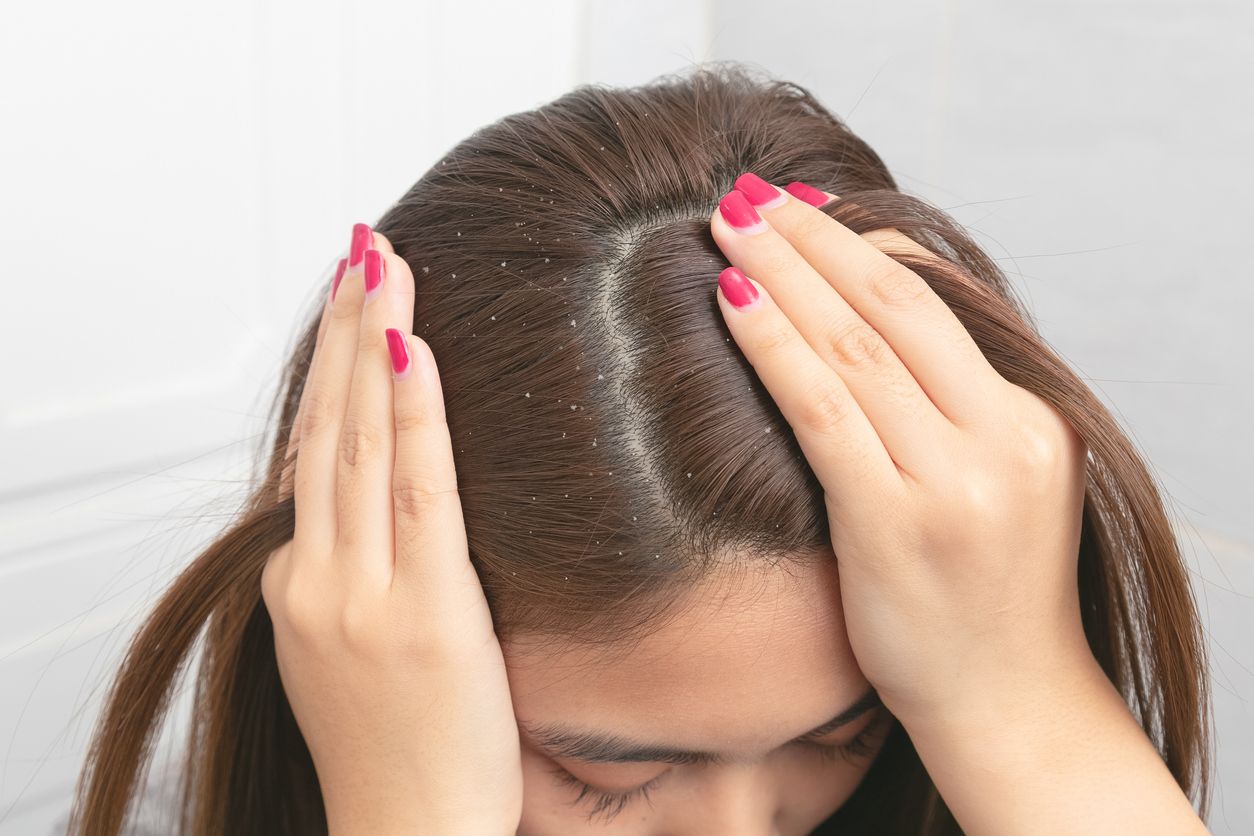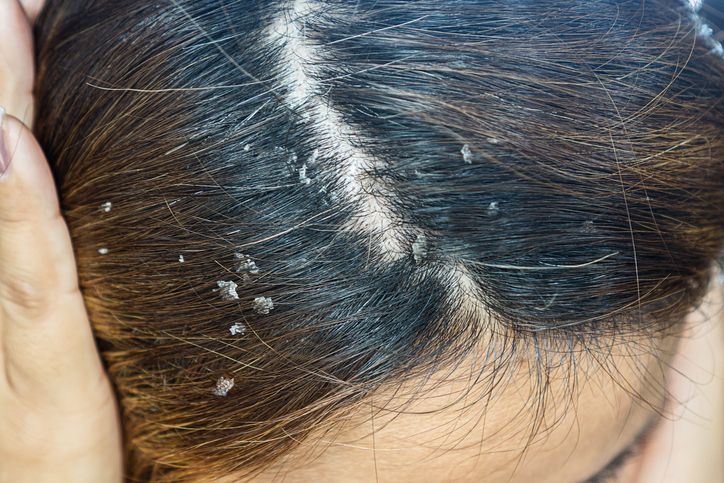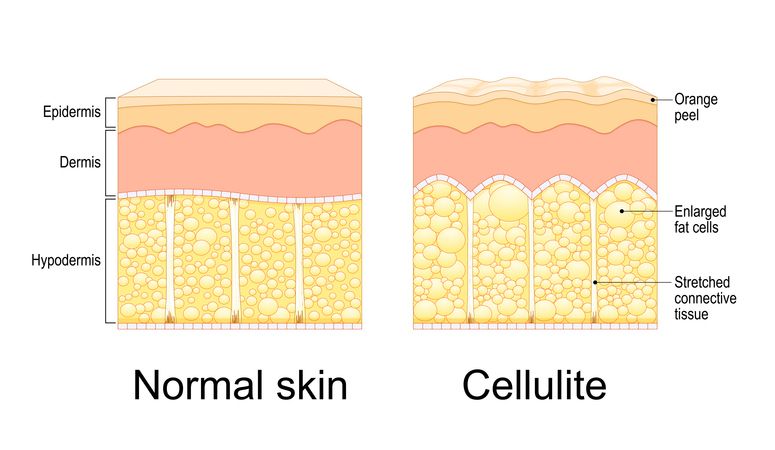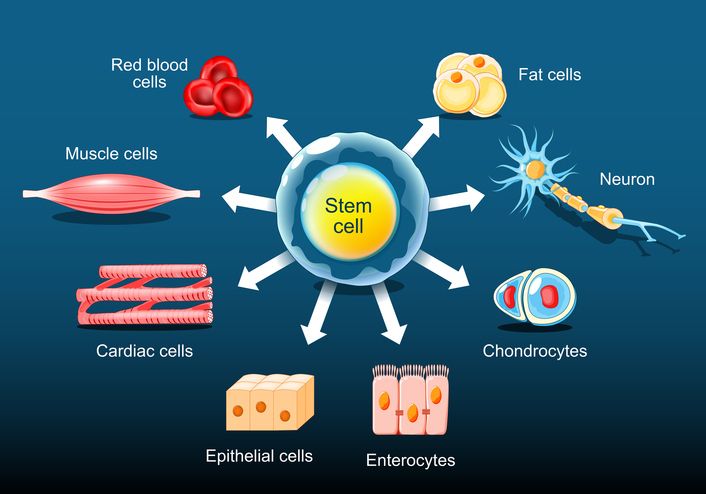
Author: Natalie Ng|Updated: 8 May 2025
You don’t need harsh products to deal with dandruff. Simple changes, like using natural oils or cutting back on drying ingredients, can make a big difference if you’re dealing with an itchy scalp or stubborn flakes. Dandruff can be caused by things like seborrheic dermatitis, fungal growth, or buildup from shampoos and styling products, all of which affect how your scalp sheds skin cells. There are plenty of ways to treat dandruff at home without turning to medicated shampoos or products that irritate sensitive skin. Coconut oil, tea tree oil, apple cider vinegar, and even small diet changes can help reduce irritation, calm inflammation, and support your scalp’s natural balance. Keep reading for 10 easy ways to prevent dandruff and improve scalp health—without using anything too harsh.

The Root Causes of Dandruff

More than just a dry scalp
Dandruff isn’t always caused by dryness. In many cases, the issue comes from a mix of triggers—some internal, some external. One of the most common causes is a yeast called Malassezia. It naturally lives on the scalp, but when it grows too much, it can lead to irritation and faster skin cell turnover. This creates those flakes most people try to wash away with dandruff shampoos.
Impact of scalp conditions and fungal growth
Scalp issues like seborrheic dermatitis, psoriasis, or eczema can also trigger dandruff symptoms. These are inflammatory skin disorders that affect the scalp barrier and may cause scaly patches, itching, or redness. In some cases, the body reacts to excess skin cells or fungal overgrowth by shedding dead skin cells more quickly, which shows up as white or yellow flakes.
Washing habits and product use
Too much washing can dry out the scalp and irritate sensitive skin, especially if you use strong hair products or shampoos with harsh ingredients. On the other hand, not washing enough can lead to oil buildup, which feeds fungal growth and worsens dandruff. The type of shampoo you use—whether it’s a gentle shampoo, coal tar shampoo, or one with salicylic acid—also affects your scalp health.
Lifestyle effects on the scalp microbiome
Your immune system, stress levels, diet, and even sleep affect your scalp microbiome and how your skin reacts. Stress and a poor diet can make your scalp more reactive, weaken its natural barrier, and allow inflammatory conditions to flare up. A lack of omega 3 fatty acids or natural oils in your diet can lead to dry and itchy scalp, making things worse over time.
10 Easy Ways to Prevent Dandruff Naturally:
1. Essential Oil Treatments for a Healthy Scalp
Tea tree oil helps reduce scalp irritation
Tea tree oil is one of the most effective essential oils for treating dandruff symptoms. Its natural antifungal and antimicrobial properties make it helpful for targeting fungal growth like Malassezia, which often causes flaking and scalp irritation. It also helps relieve inflammation linked to seborrheic dermatitis and other scalp conditions.
For a basic treatment, mix a few drops of tea tree oil with a carrier oil like coconut oil or jojoba oil. This helps avoid an allergic reaction or sensitivity, especially for those with sensitive skin. Apply the mixture directly to your scalp and massage it in gently. Let it sit for 15–20 minutes before rinsing with a gentle shampoo. Do this twice a week to support a healthier scalp microbiome and reduce symptoms like itching and flaking.
Mix natural oils the right way
Using essential oils safely means mixing them in the right ratios. Combine 2–3 drops of essential oil with 1 tablespoon of a carrier oil. Good carrier oils for scalp treatments include coconut oil, jojoba oil, olive oil, and argan oil. These oils help moisturize the scalp and support the skin barrier, especially if you have a dry scalp or are prone to buildup of dead skin cells.
You can also combine tea tree oil with other scalp-friendly oils like rosemary or peppermint oil. Mix your blend in a small, dark glass bottle to protect the oils from light and keep them fresh. Always do a patch test before using any new mixture to avoid irritating sensitive skin.
Apply oil treatments the right way
Apply oils to slightly damp hair to help them absorb better. Use your fingertips to gently massage the oil into your scalp in small circles. Work in sections so you can spread the oil evenly. Don’t apply too much pressure—this can cause scalp irritation or damage hair follicles.
For deeper treatments, leave the oil on overnight and cover your hair with a clean towel or shower cap. Wash thoroughly in the morning to remove buildup without drying out your scalp. Repeat once or twice a week for lasting results.

2. Diet Support That Helps Keep Your Scalp in Balance

A balanced diet supports your skin from the inside
While food alone won’t treat dandruff, what you eat can still influence overall skin health, including your scalp. Eating a balanced diet gives your body the nutrients it needs to keep skin cells functioning properly and to maintain a stronger skin barrier. This doesn’t replace targeted treatments, but it can support other steps you’re taking to manage dandruff symptoms.
Add healthy fats to avoid dryness and irritation
Healthy fats like omega 3 fatty acids may help reduce skin inflammation in some cases. Including foods like salmon, walnuts, flaxseeds, and chia seeds in your meals may support scalp hydration and help limit dryness. While they won’t treat severe seborrheic dermatitis or fungal growth directly, they may help reduce scalp irritation over time when paired with the right scalp treatments.
Stay hydrated to support skin function
Drinking enough water helps your skin stay flexible and less prone to irritation. It won’t cure dandruff, but if you’re constantly dehydrated, your skin—including your scalp—can become more reactive. Keeping your body well-hydrated can help your scalp stay balanced, especially when combined with gentle shampoo routines and proper topical care.
Try probiotic-rich foods in moderation
Although the link between gut health and scalp conditions isn’t fully clear, eating probiotic foods like yogurt, kefir, or fermented vegetables may support your immune system. This may help your body react better to skin triggers and keep inflammation under control. It won’t replace medicated shampoo or essential oil treatments, but it may offer a small boost when used alongside proven methods.
Date should not be before minimal date

3. Apple Cider Vinegar Rinses for Scalp Buildup
Helps remove buildup, but not a fix for dandruff
Apple cider vinegar is often used as a scalp rinse to cut through product buildup and excess oil. Some people find it helps with itchiness or flaking, especially if their scalp feels greasy or unbalanced. But while it can refresh the scalp, it won’t treat the root causes of dandruff like fungal overgrowth or inflammatory skin disorders. It's not a cure, but it may help support a cleaner scalp when used the right way.
Always dilute before using
ACV is very acidic, so you’ll need to mix it with water to avoid irritation. Use one part apple cider vinegar to three parts water. Apply the mix to your scalp after shampooing, let it sit for about 5 to 10 minutes, then rinse thoroughly. This can help break down residue from hair products and remove dead skin cells without scrubbing too hard.
Be careful if you have sensitive skin
If your scalp is dry, inflamed, or easily irritated, apple cider vinegar might make things worse. You may notice redness or stinging, especially if there are small cuts or raw spots on your scalp. If that happens, stop using it and focus on gentler scalp treatments instead. For some people, even diluted vinegar is too strong, especially if they already have seborrheic dermatitis or other skin conditions.
Use it once a week at most, and always rinse it out completely. This helps prevent dryness or damage while keeping your scalp clean and balanced.

4. Simple Scalp Massage Techniques
Supports circulation and oil balance
Scalp massage isn’t just relaxing—it can also help with dandruff. Regular massage helps boost blood flow to your scalp, which supports healthier skin and natural oil production. This can reduce dryness and help remove dead skin cells that build up over time. It also spreads natural oils more evenly across your scalp, which helps prevent flaky patches and clogged follicles.
Gentle pressure works best
Use the pads of your fingers—not your nails—to make slow, circular motions across your scalp. Start at the front hairline and move toward the back. Apply light to medium pressure. Pressing too hard can cause scalp irritation, especially if you’re already dealing with a dry and itchy scalp.
You can massage your scalp dry, or while shampooing to help lift away flakes. Doing it during a warm shower is ideal because the steam softens skin cells and makes the massage more effective.
Add natural oils for extra benefits
If your scalp feels dry, adding a few drops of coconut oil, olive oil, or diluted tea tree oil before massaging can help. These natural oils offer extra moisture and help soothe irritation. Let the oil sit for at least 20–30 minutes before rinsing. You can also leave it overnight with a shower cap for deeper hydration.
Aim to massage your scalp 3–4 times a week. It’s a simple step that supports overall scalp health and can work well alongside other scalp treatments.

5. Coconut Oil: A Natural Moisturiser That Fights Flakes
Helps calm irritation and fungal growth
Coconut oil is one of the most effective natural oils for treating a dry and itchy scalp. It contains lauric acid, which has antimicrobial properties that may help reduce fungal growth linked to dandruff. It also forms a barrier that locks in moisture and protects the scalp from irritation caused by dryness or over-washing.
Easy to apply and gentle on sensitive skin
Scoop a small amount of coconut oil into your palms and warm it up by rubbing your hands together. Once it turns to liquid, apply it directly to your scalp. Use your fingertips to massage it in with slow, circular motions, making sure to cover the entire scalp.
Let it sit for at least 30 minutes before washing it out with a gentle shampoo. If your scalp feels very dry, you can leave it on overnight with a shower cap to prevent oil transfer onto your pillow.
Don’t overdo it
While coconut oil is helpful, using too much or applying it too often can cause buildup, especially if you don’t wash your scalp thoroughly. This may clog pores or attract more excess skin cells, making dandruff worse for some people. Start with once or twice a week and adjust based on how your scalp reacts.
Used correctly, coconut oil offers a simple, soothing way to treat dandruff without relying on harsh products or medicated shampoos.
Date should not be before minimal date

6. Yogurt and Probiotics for Scalp Balance
Helps support the scalp’s natural microbiome
Plain, unsweetened yogurt contains live bacteria that may help balance the scalp environment. When applied directly, it can calm inflammation and support the growth of healthy scalp commensals. This may help reduce the conditions that trigger dandruff symptoms like itching, redness, or flaking.
How to apply it as a scalp mask
Spoon 2 tablespoons of plain yogurt into a bowl and mix it with 1 teaspoon of raw honey. Apply the mixture to your scalp using your fingertips or a clean brush. Cover all areas of the scalp and let it sit for about 20 minutes before rinsing it out with lukewarm water and a gentle shampoo.
You can use this mask once a week to soothe a dry and itchy scalp. If you like, add a small amount of aloe vera gel or a few drops of diluted tea tree oil to increase its calming and antifungal properties.
Supports moisture and pH balance
Yogurt naturally helps restore moisture while keeping your scalp’s pH in check. It won’t treat severe dandruff on its own, but it can be a helpful part of your routine if you prefer gentle, natural scalp treatments. It works best as a support step alongside other proven methods like essential oils or dandruff shampoos.

7. Tea Tree Solutions for Flake Control
A proven natural remedy for dandruff
Tea tree oil is one of the most researched essential oils for treating dandruff. It has strong antifungal and anti-inflammatory properties that help fight the root causes of flaking, including fungal overgrowth and scalp irritation. It also soothes itching and helps reduce redness, making it especially useful for dry and itchy scalp or mild seborrheic dermatitis.
Add it to your shampoo or use it as a treatment
For daily use, you can add 10–15 drops of tea tree oil to your regular gentle shampoo. This turns it into an easy scalp cleanser that helps manage dandruff symptoms without needing extra steps. Shake well before each use to make sure the oil is mixed properly.
For a deeper treatment, mix 5–8 drops of tea tree oil with 1 tablespoon of a carrier oil like coconut oil or jojoba oil. Massage it into your scalp, let it sit for 30–60 minutes, then rinse with a mild shampoo. This can be done once or twice a week.
Use it safely to avoid irritation
Tea tree oil is potent, so always dilute it with a carrier oil before applying it to your scalp. Undiluted oil may cause an allergic reaction or irritate sensitive skin. Start with a small amount and do a patch test on the inside of your arm before full use.
When used correctly, tea tree oil can help reduce flaking and improve overall scalp health without relying on medicated products.

8. Proper Hair Washing Habits and Timing
Keep your scalp clean without over-washing
Washing your hair too often can strip away natural oils, leading to a dry and irritated scalp. On the other hand, washing too little can cause oil, sweat, and dead skin cells to build up, which may trigger dandruff or make it worse. The goal is to find the right balance for your scalp type.
If you have an oily scalp, wash your hair every other day using a gentle shampoo. For normal to dry scalp, 2–3 washes per week are usually enough. This helps remove buildup without disrupting the skin barrier or causing extra flaking.
Use lukewarm water and gentle massage
Hot water can dry out your scalp and increase irritation, especially if you already have dandruff symptoms. Stick with lukewarm water and focus on massaging your scalp gently for 2–3 minutes while shampooing. This helps lift dirt and flakes without causing damage or scalp die-off.
Rinse thoroughly to remove all traces of shampoo and conditioner, especially near the hairline and crown, where buildup often occurs. Any leftover residue can clog pores or trigger dandruff symptoms again.
Adjust your routine with the seasons
Your scalp may react differently to changes in weather. You might need to wash more often during hot, humid months if your scalp gets oily, or less often in winter if your scalp feels dry and itchy. Pay attention to how your scalp responds and adjust your washing schedule as needed.
Date should not be before minimal date

9. Managing Stress to Support Scalp Health
Stress can affect your scalp more than you think
Ongoing stress doesn’t just wear you down mentally—it can also throw off your scalp’s balance. High stress levels increase cortisol, which can lead to more oil production, irritation, and flaking. If you already deal with seborrheic dermatitis or other skin conditions, stress can make symptoms worse and harder to manage.
During stressful periods, it’s common to notice more dandruff, especially if your immune system is under pressure. Your scalp might feel itchier, more sensitive, or develop flakes faster than usual.
Keep your routine simple and consistent
You don’t need a complicated plan to manage stress. A short walk outside, a regular bedtime, or cutting back on late-night screen time can help your body reset. Getting enough rest gives your scalp time to repair itself, while light exercise helps with circulation and supports healthier skin function.
Even 10 minutes a day of movement or quiet time can help reduce the kind of internal stress that often shows up as scalp irritation.
Supports other steps you’re already taking
Managing stress won’t replace targeted dandruff treatments, but it can make them more effective. A balanced body is less reactive to triggers like oil buildup, weather changes, or product ingredients. When combined with other scalp care steps—like using tea tree oil, gentle shampoos, or proper washing routines—stress control can help keep your scalp more stable and less prone to flare-ups.

10. Choose Products That Don’t Trigger Dandruff
Harsh ingredients can make things worse
Some hair products do more harm than good when it comes to dandruff. Ingredients like strong sulfates, heavy fragrances, or alcohol-based formulas can strip your scalp’s natural oils, irritate sensitive skin, and trigger flaking. If you’re dealing with a dry or itchy scalp, switching to gentler products is a simple way to avoid making it worse.
Even medicated shampoos, while helpful for some, can cause scalp irritation if overused or not matched to your skin type. If you have allergic reactions or inflammation after using certain shampoos or conditioners, it’s worth checking the ingredient list or rotating to a milder option.
Use gentle, scalp-friendly formulas
Look for shampoos labeled as sulfate-free or made for sensitive skin. These are less likely to disrupt your scalp barrier or trigger dryness. If you need a medicated product, start with something mild—like a coal tar shampoo, salicylic acid shampoo, or one made with zinc pyrithione. Use it only as often as needed, and alternate with a gentle shampoo to avoid over-drying.
You can also support scalp health by using products with aloe vera, natural oils, or anti-inflammatory ingredients that help calm redness and irritation without clogging pores or causing buildup.
Pay attention to how your scalp reacts
Everyone’s scalp is different. What works for one person may not work for another—especially if you have underlying skin conditions or a naturally oily scalp. If your current products are making your symptoms worse, swap them out one at a time and give your scalp a few days to adjust. You don’t need a complicated routine—just one that keeps your scalp clean, calm, and balanced.

Support Dandruff Treatment with New Beauty’s F8 Hair Regrowth Therapy
A scalp treatment that works beyond surface care
If you're looking for a way to treat dandruff that goes beyond at-home remedies, the F8 Hair Regrowth Treatment can be a helpful addition to your routine. This non-invasive scalp treatment uses low-energy laser technology paired with a high-quality hair growth serum to improve scalp health from the root up. While F8 is often used for hair regrowth, it also supports dandruff treatment at home by targeting scalp irritation, clogged follicles, and sebum buildup—some of the main triggers for flakes and itching.
How F8 helps reduce dandruff symptoms
The treatment begins with a scalp analysis to identify problem areas. A professional then applies a low-energy laser evenly across the scalp to stimulate the hair papilla, boost microcirculation, and strengthen surrounding capillaries. This step supports healthy blood flow, allowing nutrients to reach the hair follicles more efficiently, which is especially important for those dealing with dry and itchy scalp, inflammation, or excess skin cells.
After laser stimulation, a hair growth serum is applied and absorbed more deeply thanks to the laser’s effect. This serum helps remove dead skin cells, calm sebum production, and hydrate the scalp—all key factors in creating a better environment for hair to grow and reducing dandruff symptoms. By improving overall scalp health, the F8 treatment can enhance the effects of other topical methods like tea tree oil, apple cider vinegar rinses, or gentle shampoo routines.
Why F8 supports a healthy scalp
• Non-invasive: No needles, no downtime, and suitable for sensitive skin
• Cleanses and hydrates: Helps unclog pores, reduce oil, and moisturize the scalp
• Boosts circulation: Improves nutrient delivery through microcirculation
• Safe for all: Suitable for both women and men with scalp concerns
• Pairs well with home care: Can work alongside other scalp treatments and natural remedies
If you’re looking for a scalp treatment that supports dandruff symptoms and strengthens your hair at the same time, F8 offers a gentle but effective solution. It’s especially helpful if home remedies aren’t enough or if you’re dealing with seborrheic dermatitis, scalp irritation, or recurring flaking.
Book F8 today to experience the benefits of F8 and take another step toward a clearer, healthier scalp.
F8 Hair Regrowth TreatmentDate should not be before minimal date
FAQ
1. Can dandruff shampoos cause more dryness on the scalp?
Yes, many over the counter dandruff shampoos, especially those with strong cleansing agents, can dry out the scalp if used too often. This can lead to increased flaking, scalp irritation, or even worsen dandruff in people with sensitive skin. It's best to use a gentle shampoo or alternate between a medicated shampoo and a moisturizing formula to maintain scalp health without stripping away natural oils.
2. Is there a difference between dandruff and scalp buildup from hair products?
Yes, they are different but often confused. Dandruff is usually linked to skin conditions like seborrheic dermatitis or fungal overgrowth, while product buildup comes from excess use of styling products that aren’t washed out properly. Buildup can clog pores and contribute to oily scalp or flaking, so regular cleansing and occasional scalp treatments help reduce both issues.
3. Can I treat dandruff if I have an oily scalp and still keep my hair moisturized?
Yes, you can. An oily scalp doesn't mean your skin is properly hydrated. In fact, some people experience both excess oil and dry patches at the same time. Look for scalp treatments with lightweight natural oils like jojoba oil or diluted tea tree oil, which help balance oil production and reduce fungal growth without adding heaviness.
4. What are some common ingredients that irritate sensitive scalp types?
People with sensitive skin or scalp conditions may react to ingredients like sulfates, alcohol, strong fragrances, or preservatives often found in certain hair products. These can disrupt the scalp barrier, trigger dandruff symptoms, or worsen itching and flaking. Always patch test new products and opt for formulas labeled safe for sensitive skin or made with anti inflammatory properties.
5. How do I know if my dandruff is caused by a fungal infection or something else?
Dandruff caused by fungal infections like Malassezia usually appears as white or yellow flakes, sometimes with redness or itchiness. If you're unsure, look at how your scalp reacts to common treatments. If standard shampoos and home remedies don’t help, or if the flaking spreads, it could be due to other inflammatory skin disorders like psoriasis or atopic dermatitis. In these cases, it's best to see a board certified dermatologist for a proper diagnosis.
Recommended Articles
COPYRIGHT© NEW BEAUTY MANAGEMENT LIMITED 2026. ALL RIGHT RESERVED.




